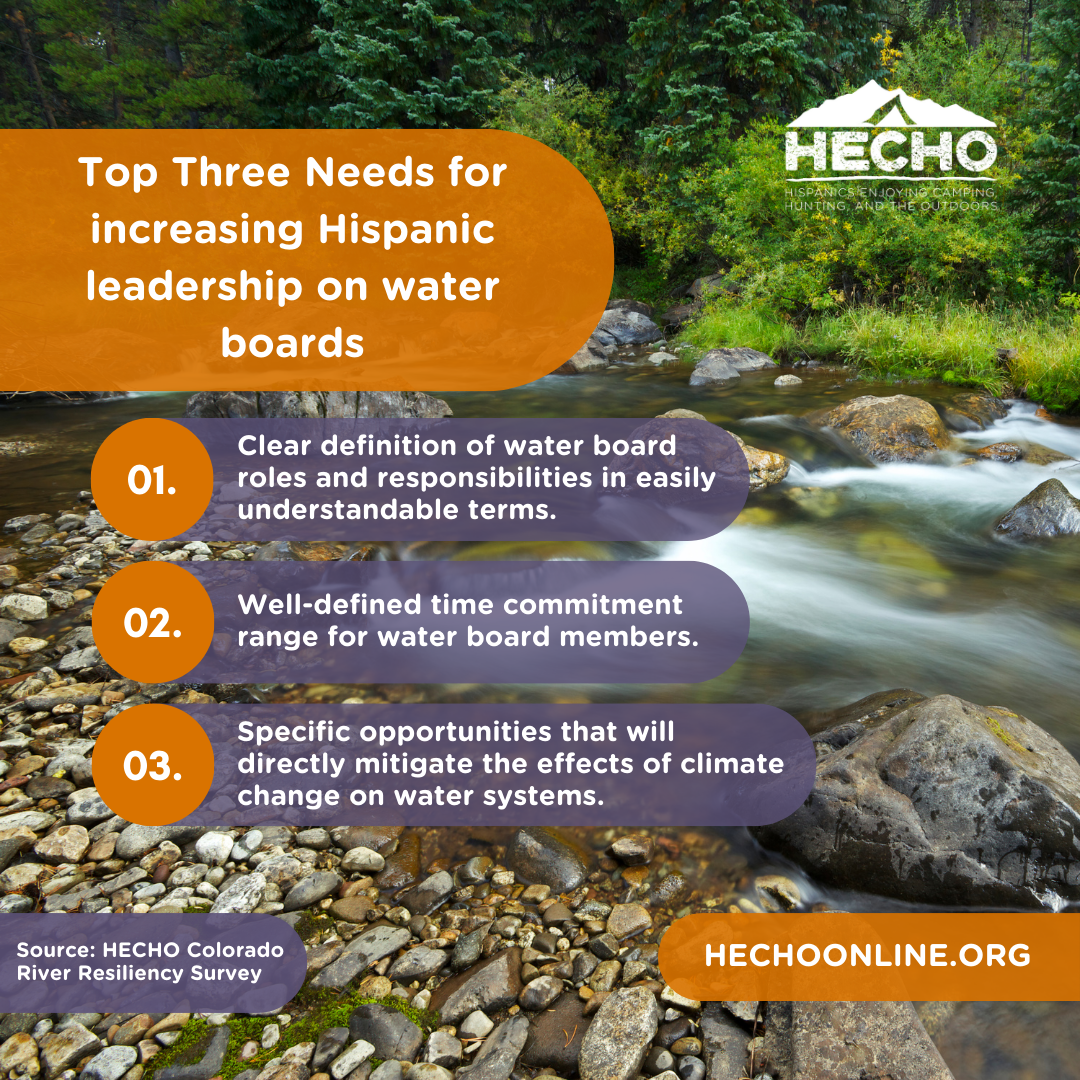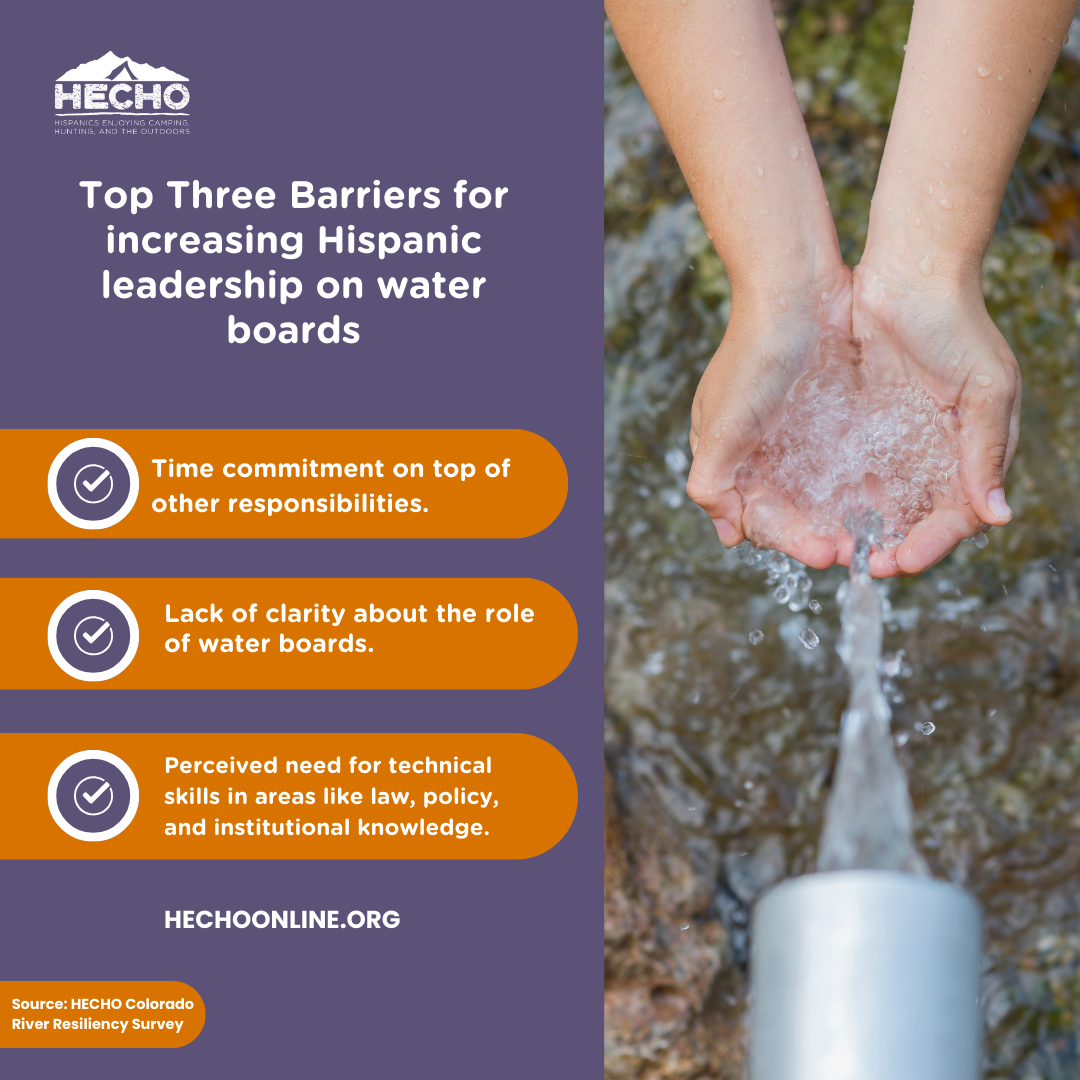Recommendations for Increasing Hispanic Leadership and Participation in Shaping the Future of Colorado River Basin Resiliency
Hispanics Enjoying Camping, Hunting, and the Outdoors (HECHO) believes that existing Hispanic leaders, such as those in our Hispanic Conservation Leadership Council network, can leverage their position, network, and platform to help increase more widespread awareness and participation within Hispanic communities in establishing and implementing resiliency policy and projects for the Colorado River Basin.
To better understand our current and potential Hispanic Conservation Leadership Council (HCLC) members’ participation and awareness of issues about Colorado River Basin resiliency and water boards, HECHO surveyed 43 Hispanic elected, appointed, and community leaders from Arizona, Colorado, Nevada, New Mexico, and Utah, where HECHO functions, and where the effects of drought are severe, especially for the Colorado River.
The survey consisted of two key questions:
What are the top three barriers and top three needs for HCLC members/potential HCLC members to become more involved in shaping the resilience of the Colorado River Basin?
What are the top three barriers and top three needs for HCLC members/potential HCLC members to join water boards?
Based on the findings of the Colorado River Resiliency Survey and additional conversations HECHO staff had with HCLC members and partner organizations, we drafted a series of recommendations to address the mentioned needs and barriers:
1-There should be a dedicated effort to address gaps in water education and capacity. The recommendations to support that effort include:
Create a central online hub to house a library of comprehensive, free, and easily accessible educational materials to support a person’s ability to develop a deeper comprehension of Colorado River management, the governing policies, and the entities involved.
Ensure educational materials are available in multiple languages.
Increase educational media opportunities.
Partner with public schools and community colleges to provide programming about the Colorado River Basin.
Recruit diverse community partner organizations to help with widely disseminating educational materials and messages.
Dedicate outreach efforts to Hispanic and Hispanic-serving communities, as well as other underserved areas, to ensure access to and utilization of these valuable resources.
2-Increase awareness of water boards to promote engagement and future leadership. To engage more Hispanic leaders in shaping the vision of the resiliency of the Colorado River, we recommend:
Develop a multi-lingual public information campaign to inform people about what water boards do, the training and time commitment needed, and how they enact changes for the community.
Chart out a ladder of engagement for the types of experiences people should obtain to feel confident in being on a water board.
Utilize innovative strategies to publicize vacant water board roles, responsibilities, and meetings and utilize various communication channels for increased awareness and engagement of multi-lingual communities.
Translate Basin Implementation Plans and other water-related documents, ensuring equity regardless of language background or technical expertise.
Create a central hub with information about all the various water boards that provide input on decisions about the Colorado River Basin.
Create a robust training and mentorship program to be offered by water boards that support building a pipeline of new water leaders.
Collaborate with and outreach to acequia parciantes to connect Hispanic heritage and traditional water conservation to broader water conservation planning and policy-making.
3- The survey indicated that Hispanic leaders face barriers to engaging in Colorado River Basin issues and joining water boards due to a lack of capacity, including policy and institutional knowledge, skills, and financial resources necessary for effective participation and decision-making. To address these obstacles, our recommendations include:
Provide a virtual and/or in-person orientation about the Colorado River Basin issues to all newly elected officials within the first six months of their tenure, focusing on historically underrepresented populations, including Hispanics.
Develop funding streams to provide financial assistance and scholarships to reduce barriers for and support historically underrepresented individuals’ ability to build the experience and confidence needed to join water boards.
Enhance the worth of water board positions by implementing a comprehensive approach that includes financial compensation.
Develop training self-assessments to support baseline setting and self-evaluations to gauge progress and reflect growing issue expertise.
Articulate policy and/or law education institutions or pathways that lead to professional water management careers and other educational opportunities and certifications in areas where Hispanic communities and Hispanic serving institutions are prevalent.
Collect demographic and other data on existing water board members throughout the Colorado River Basin, including demographics of those they represent/serve, assess whether and how water board members engage those they represent/serve, and identify the pathways of how water board members come to their service (elected/appointed), including an audit of the historical demographics of boards to have a baseline understanding and record of the gaps in ethnic and racial diversity.
With this survey, HECHO's goal is to catalyze public conversation on diverse representation in water conservation issues and water boards.
For more information about this survey and findings, click here.




